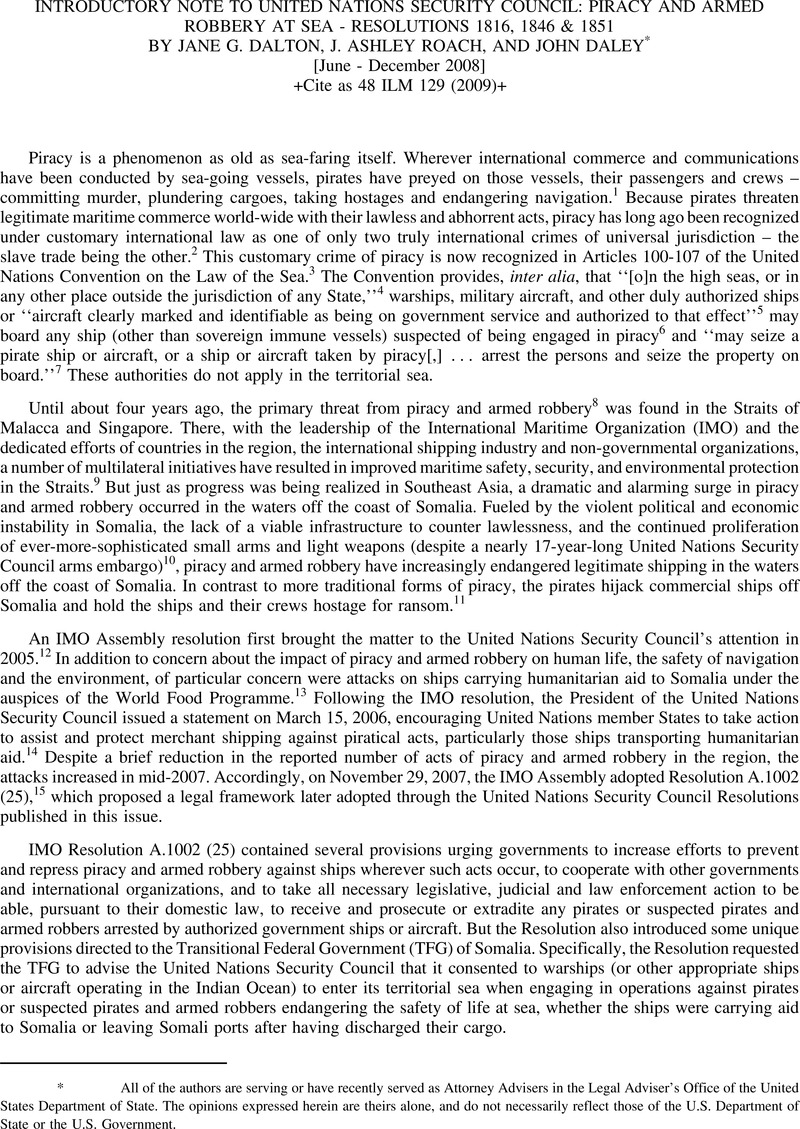Article contents
United Nations Security Council: Piracy and Armed Robbery at Sea - Resolutions 1816, 1846 & 1851
Published online by Cambridge University Press: 27 February 2017
Abstract

- Type
- International Legal Material
- Information
- Copyright
- Copyright © American Society of International Law 2009
References
End notes
* This text was reproduced and reformatted from the text appearing at the United Nations website: (visited February 10, 2009)< http://www.un.org/Docs/sc/unsc_resolutions08.htm>
† Reissued for technical reasons.
1 Indeed, piracy provided the immediate impetus for the establishment of the United States Navy. In November 1793, word reached the United States that Algerian corsairs had captured ten American merchant vessels, imprisoning over 110 men. This news impelled the previously-reluctant Congress into action, and President Washington signed into law an Act to Provide a Naval Armament in March 1794. See Ian W. Toll, Six Frigates 35-44 (2006). For an excellent general history of piracy, see David Cordingly, Under the Black Flag: The Romance and Reality of Life Among the Pirates (1995).
2 See, e.g., Sean D. Murphy, Principles of International Law 246 (2006) (“‘Universal jurisdiction’ traditionally was asserted over the crimes of piracy on the high seas and over persons engaged in the slave trade”).
3 United Nations Convention on the Law of the Sea, 1833 U.N.T.S. 3, 21 I.L.M. 1261 (1982).
4 Id. art. 105.
5 Id. art. 107.
6 Id. art. 110.
7 Id. art. 105.
8 The United Nations Convention on the Law of the Sea defines piracy as “any illegal acts of violence or detention, or any act of depredation, committed for private ends by the crew or the passengers of a private ship or a private aircraft, and directed . . . on the high seas, against another ship or aircraft . . . [or] in a place outside the jurisdiction of any State.” Id. art. 101. Acts that would qualify as piracy, except that they are committed within the territorial seas of a coastal state, are governed by the criminal law of the coastal state. The phrase “armed robbery at sea” refers, inter alia, to those otherwise piratical acts that occur within the domestic jurisdiction of a coastal state.
9 See, e.g., Yann-huei, Song, Security in the Strait of Malacca and the Regional Maritime Security Initiative: Responses to the U.S. Proposal, in Global Legal Challenges 97 (Michael D., Carsten ed., 2007); see also James, Kraska & Brian, Wilson, Piracy, Policy, and Law, 134 U.S. Naval Inst. Proc. 53, 56 (2008)Google Scholar.
10 S.C. Res. 733, U.N. Doc. S/RES/733 (Jan. 23, 1992), recently reinforced by S.C. Res. 1853, U.N. Doc. S/RES/1853 (Dec. 18, 2008).
11 As of the end of 2008, 42 ships had been hijacked in 2008; 14 are still held, along with nearly 300 seafarers, for ransom. There are reports that up to $50 million USD have been paid to the pirates in 2008 alone.
12 I.M.O. Res. A /24/Res. 979, U.N. Doc. A /24/Res. 979 (Feb. 6, 2006). See, News Briefing 47, International Maritime Organization, IMO Assembly Issues Renewed Call for Action on Piracy off Somalia (Nov. 29, 2007),<http://www.imo.org/Newsroom/mainframe.asp?topic_id=1472&doc_id=8751> (last visited Nov. 30, 2008).
13 In November 2007, the IMO reported that close to 80% of World Food Programme assistance to Somalia was shipped by sea, but that due to piracy the available ships willing to carry food had been halved. Id. U.N. Security Council Resolution 1838 noted that some humanitarian reports estimated that as many as three-and-a-half million Somalis would be dependent on humanitarian food aid by the end of 2008, and that maritime contractors for the World Food Programme would not deliver food aid to Somalia without naval warship escorts; see S.C. Res. 1838, U.N. Doc. S/RES/1838 (Oct. 7, 2008).
14 Statement by the President, Security Council, U.N. Doc. S/ PRST/2006/11 (March 15, 2006).
15 I.M.O. Res. A/25/Res. 1002, U.N. Doc. A/25/Res. 1002 (Nov. 29, 2007).
16 Press Release, U.S. Dept of State, Somali Piracy Doc. 2008/ 824 (Oct. 2, 2008),< http://2001-2009.state.gov/r/pa/prs/ps/2008/oct/110575.htm>.
17 S.C. Res. 1816, U. N. Doc. S/RES/1816 (June 2, 2008).
18 Id. ¶ 7(a).
19 These two provisions were included to reassure those Members particularly sensitive to protecting national sovereignty.
20 Press Release, U.S. Department of State, supra note 16.
21 Press Release, U.S. Naval Forces Central Command Public Affairs, Maritime Security Patrol Area to be Established Release # 105-08 (Aug. 22, 2008),< http://www.cusnc.navy.mil/articles/2008/105.html> (last visited Jan. 5, 2009).
22 Piracy, Policy, and Law, supra note 9, at 56.
23 See Resolution 1838, supra note 13 and Resolution 1851, infra note 28. For example, the M/V Sirius Star was attacked 500 nautical miles off the coast of Kenya.
24 Press Release, NATO, NATO Naval Task Group en Route to Escort Duties off Somali Coast (Oct. 24, 2008),< http://www.nato.int/shape/news/2008/10/081024a.html> (last visited Nov. 12, 2008).
25 Press Release, Council of the European Union, Council Adopts Joint Action on a European Union Military Operation Against Acts of Piracy and Armed Robbery off the Somali Coast, 1547/08 (Presse 321) (Nov. 10, 2008),< http://www.consilium.europa.eu/uedocs/cms_Data/docs/pressdata/en/misc/103937.pdf>.
26 S.C. Resolution 1838, supra note 13.
27 S.C. Res. 1846, U.N. Doc. S/RES/1846 (Dec. 2, 2008).
28 S.C. Res. 1851, U.N. Doc. S/RES/1851 (Dec. 16, 2008).
29 Id. ¶ 6 (emphasis added).
- 3
- Cited by




